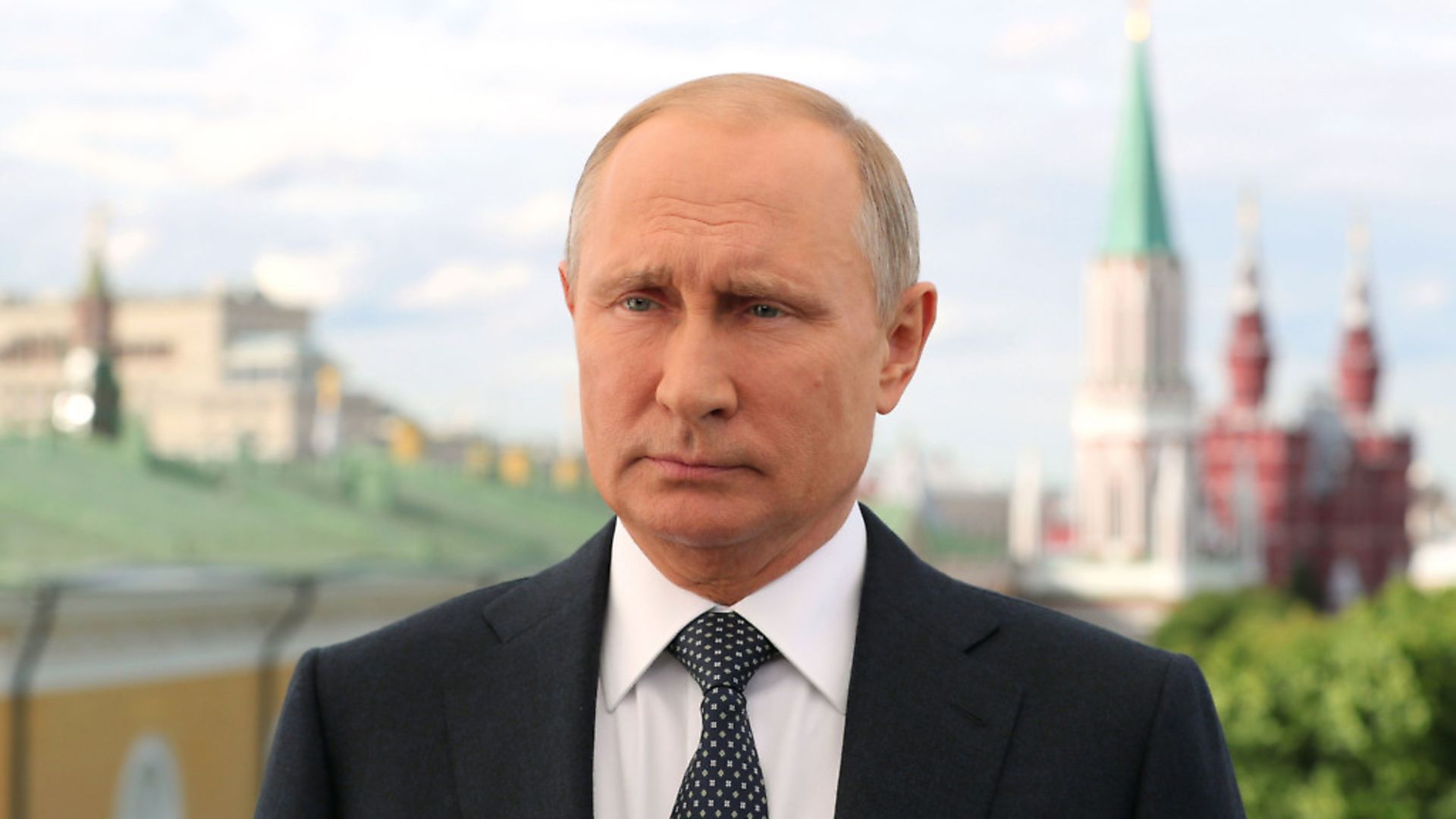
The Russian president has used previous sports tournaments to distract from aggressive actions. Is he doing the same again?
Russian President Vladimir Putin loves big international sporting events. They provide a perfect distraction from his most malevolent plans.
While the world was watching the opening of the Beijing Olympics in 2008, the then prime minister Putin was directing an invasion of Georgia. That conflict achieved his aims and met little resistance from the West.
Suitably emboldened, Russia subsequently invaded Ukraine as the 2014 Winter Olympic festivities in Sochi wound down.
This pattern has raised concerns that Putin may be planning another assault at the end of the World Cup. Much of the planet is captivated by the tournament taking place in Russia. But Putin is not a football fan. His obsessions are power and preserving his accumulated wealth and his focus is on using the smokescreen provided by the World Cup to pursue those interests.
In keeping with the scenario before the invasions of Georgia and Ukraine, the intensity of Russia’s activities is rising. These include sabre-rattling and cyber-attacks against countries such as Ukraine, Estonia, Latvia and Lithuania – not to mention the Novichok poisoning of the Skirpals in Salisbury a few months ago. Although perhaps even its architects did not foresee that particular operation resurfacing quite so spectacularly, and tragically, while the tournament was still on.
Meanwhile, the Kremlin’s stooges are cranking up their bellicose rhetoric, with threats even made against neutral Sweden. Aside from the verbal onslaught, the Scandinavian country is a growing target for intimidation from Moscow, including the Russian air force’s reckless tactic of flying military planes in civilian airspace with their radar transponders turned off. Russian jets rendering themselves undetectable in this way drastically increases the risk of them downing a passenger airliner.
The escalating Russian threat has jolted Sweden into urgently addressing its defence capabilities. Some opinion polls are showing, for the first time ever, a majority of Swedes in favour of joining NATO.
Both Georgia and Ukraine were seeking closer integration with NATO and the EU when Russia attacked them. Indeed, Russia’s invasion of Georgia was a turning point towards more nakedly adversarial global relationships.
It has sometimes been suggested, not only by Kremlin apologists, that Russia’s aggression is a legitimate response to ‘western encroachment’ in its neighbourhood. This argument tacitly accepts Russia’s assertion that bigger countries – in its case, a brutal and corrupt dictatorship – have the right to impose their will by force on their smaller neighbours.
They do not. Rather, sovereign states in the 21st century have an absolute legal and moral right to pursue their own policies and alliances.
There is no justification for their former colonial overlords subjecting them to bullying and spurious ‘sphere of influence’ claims.
Whatever the supposed validity of Russia’s claims, it has plenty of other options for pursuing its interests apart from sending in the tanks. Russia is a global power and permanent UN Security Council member with considerable diplomatic influence at its disposal. It has economic clout too, as a major oil and gas producer. In the specific instance of relations with NATO, Russia has the unique privilege of an established mechanism for resolving its differences with the Alliance, the NATO-Russia Council.
Perhaps Russia’s leaders should take some time to ponder why so many of its neighbours distrust them. Then use some of these non-violent tools it has available to change hearts and minds.
In reality, Russia’s attacks on its neighbours are driven by the Putin regime’s ‘zero-sum’ mentality. This mindset dictates that for them to be strong, others must be weakened and battered into submission. Most of all, Russia’s assaults are driven by fear.
Putin is terrified of the demonstration effect of Russia’s neighbours prospering, particularly its fellow former Soviet ones. Their success in developing democracy and clean, competent government would prompt the Russian people to question why their country cannot do the same. Putin is acutely aware that this eventuality could spell the end of his kleptocracy, with perilous personal consequences for him.
Putin sees the EU, NATO and their member states as projecting a similarly positive (but not for him) example. He believes they provide support and inspiration to would-be democrats and anti-corruption aspirants closer to home.
These fears explain Russia’s comprehensive support for extremists, mainly on the far-right, around Europe and its manipulation of elections and referendums. Its aim is to weaken the West and its alliances.
Moscow’s malign motivations remain strong. The precedents, and Russia’s current threatening behaviour, fully justify the concerns that the Kremlin will again exploit the cover of an international sporting extravaganza to wreak havoc on an unfortunate neighbour.
But there is a new factor, which may lead to events taking a different course this time: Donald Trump. Trump and Putin have scheduled a summit in Helsinki on July 16, the day after the World Cup Final.
As the investigations into Trump’s election campaign have indicated, there is a possibility that Putin holds compromising personal or financial information over Trump that he can exploit in classic KGB officer fashion.
Even without such kompromat, the cunning and meticulously prepared Putin is primed to take full advantage of Trump.
As the US president has repeatedly demonstrated, he is likely to go into the meeting ill-informed and fixated on pandering to his Russian counterpart.
The callow and less wily North Korean dictator, Kim Jong-un, exposed Trump’s vulnerability in such settings at their recent summit in Singapore.
Kim significantly enhanced his status and secured a freeze on US/South Korean military exercises whilst giving nothing new or consequential in return.
Putin, on this occasion, would be similarly delighted to elicit words or actions from the US president that weaken NATO and Western alliances as a whole. This would be a far greater prize for him than militarily picking off another single would-be member of them.









